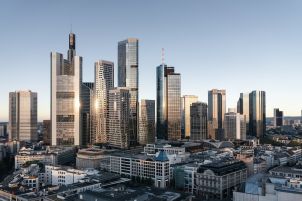What happens if an office act like a retail environment?
By offering a new alternative to customers (e-commerce) and employees (e-office), we are also addressing the crucial question of attractiveness: what would make consumers go back to shopping in a physical environment? So then, why would employees go back to the office for eight hours a day if they now have the option of working from their garden? To justify bringing customers back into the shop, the retailer must offer more than just the product. And that means the experience. In the same way, the company must also go beyond the simple use of the workspace, it must offer something else, namely a collective, cultural and intellectual experience.
The officetainment revolution
Depending on the activity and the culture of the company, the building will offer different types of environments and experiences: a law firm for example will require more concentration zones than a communications agency which would rather offer creative spaces and other areas attuned to inspire. Thus, the design of an office building and the services it offers will be adapted according to the specific needs of the occupants. In the same way that traditional commerce is reinventing itself with retailtainment, the office building will only survive if it adapts to these changes and this paradoxical shift. In order to reinvent itself, it must make use of officetainment.
There are also other similarities with retail: in shopping centres, the surface area of shared spaces is now greater than that of private commercial units. This can be explained in particular by the reduction in the size of storage spaces in shops, but also because shopping centres are making greater use of common areas to organise events and provide their customers with a retail experience. These are the same principles that can be found in the workplace: fewer individual offices, more collaboration and sharing areas, where employees experience the company culture "in real life".

Property Management
As a trusted partner for our clients in providing technical assistance, rental management, follow-up and general optimisation of services to occupiers, the property management team at BNP Paribas Real Estate is becoming more and more service-oriented with the goal of improving performance and productivity to better respond to evolving client needs in a digital landscape.
Services that reflect the occupier's DNA and values
Services are an integral part of the office .The concierge service for example, might not make an employee more productive in the strictest sense of the word, but they will save time by not having to go to the dry cleaner's or the car wash to have their car cleaned.
The work environment has a great impact on employee productivity. Numerous studies have shown, for example, that access to outdoor areas, sufficient natural light or an unobstructed view of a garden, influence the feeling of well-being and, consequently, the performance of employees.
Giving employees individual support is also an important element of the services provided by an office. Coaching or training courses that directly impact the efficiency of employees, can do much for the overall productivity of an office building.
An experience that unites key services
When one enters an office building, the first impression is usually with the architecture and design of the entrance hall: is it a grandiose reception area or a cosy lobby that communicates the values of security and confidentiality?
Next, the visitor or employee experiences the building's services, including the reception area first: are they welcomed by someone? Is there a coffee bar in the lobby? Are there any self-service work spaces available?
The next part of the experience is digital. One can imagine an app that would allow an employee to be notified of the arrival of their client as soon as they reach the entrance gate, or else a personalised welcome could be envisaged thanks to facial recognition. In the same way, while some buildings used to offer standard format gyms, today the offer has been extended to allow employees to participate in workouts on site, or from their home.
The different service element must be managed simultaneously in order to create a well-rounded experience that remains consistent for all who come into contact with the building.
Just as the retail sector is now implementing omnichannel strategies to share its brand values, the company must now also rollout its remote working (or e-office) and face-to-face culture with an offer of personalised services and adapted experiences: a good Wi-Fi connection, ergonomic furniture, and high-performance applications and collaborative tools.
The digitalisation of buildings does not reduce human interaction
To help build this new omnichannel working experience, the Property Manager relies on two main areas. The first is support and advice, and the second is reliability and trust. Because the digitalisation of buildings does not reduce human interaction, quite the contrary. In order to understand the expectations of the occupier and the individuals who make up that company, the Property Manager will use data as an intuitive tool to make the building more human.
Here too, the parallel can be drawn with retail: the manager of a shopping centre does not just collect rent, but also enquires about the number of customers who pass through its aisles and the economic performance of its tenants. Because at any time, a retailer can decide to leave the shopping centre if its turnover is not sufficient. In an office building the Property Manager should also look at the services offered and analyse how they are used by the tenants. If the concierge service or the gym are not popular with the tenants then it probably means that these services need to change. In the same way, leases should probably evolve to offer more flexibility, like pop-up stores in the retail sector or co-working which questions the rigidity of the 3-6-9 lease.
Faced with the boom in remote working, some will probably have predicted the end of the sector and then the inevitable death of the office building. However, these views have been proven to be wrong. Because, like retail, the office is in the midst of a complete overhaul, creating tremendous opportunities to move towards new e-office and omnichannel experiences. In this respect, it is essential for all Property Management professions to assert themselves ever more as strategic partners of investors at the service of tenants.




